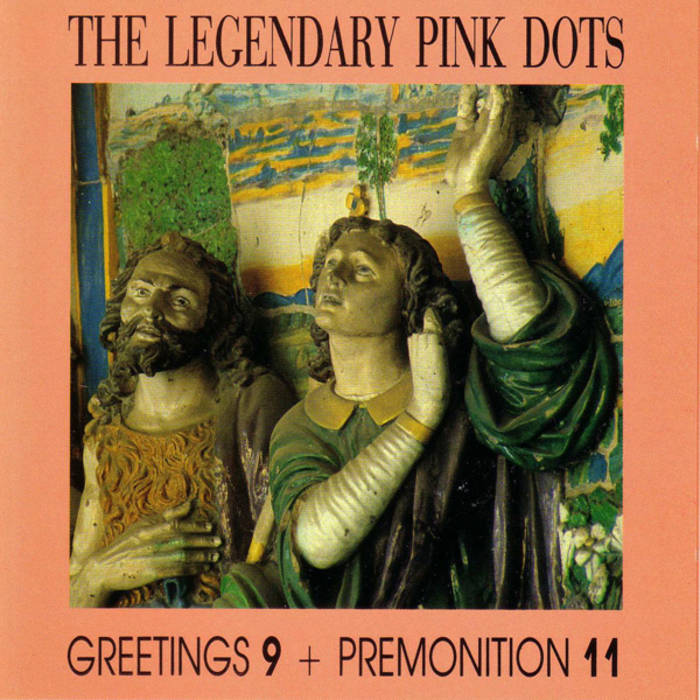
 LPD vocalist Edward Ka-Spel on the piano and Niels van Hoorn at an 14 October 2007 show at the Stubnitz boat in Amsterdam (Photo credit: Wikipedia)
LPD vocalist Edward Ka-Spel on the piano and Niels van Hoorn at an 14 October 2007 show at the Stubnitz boat in Amsterdam (Photo credit: Wikipedia)
Edward Ka-Spel’s brilliance with The Legendary Pink Dots is to introduce us to isolated characters and then immerse us in their world-view through expansive and mysterious soundscapes. He begins with the most restricted, infinitesimal point of consciousness and then slowly expands it outward towards a state of ‘cosmic consciousness’ (to use the phrase of 1960s psychonauts). Musically, he often follows this template of expansion, with simple melody lines repeating and layering in increased complexity of texture. Much of the LPD’s music is an undertaking to help the listener (and perhaps composer) escape his/her own head. Lyrical phrases, musical motifs, album titles and themes recur across decades, but tonal shifts between albums are slow and subtle. Hopefully, The Legendary Dots Project, like the Residents and Sparks projects before, will provide the keen reader and listener with a giddy entry-point into the Legendary Pink Dots’ musical world. Fulfil the prophecy!
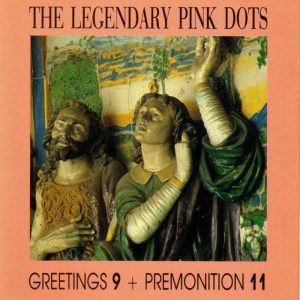
Greetings 9 + Premonition 11 (1989)
Tom: Greetings 9 opens with a trio of live versions of tracks we’ve heard elsewhere: ‘Puppets Apocalypse’ (basically ‘Love Puppets’), ‘Poppy Day’ and ‘A Lust for Powder’. ‘PD’ is not as compelling as on its album version or when I saw it live in 2014.
New tracks begin with ‘Only When I Laugh’. The depleted two-piece Dots (EKS and Phil ‘The Silverman’ Knight) initiate locomotive arpeggios – like a computer game stuck and looping, refusing to move onto the next level. There’s reverb-saturated EKS spoken words; in monologue mode, he repeats “I’d do anything for you”. It’s generally inconsequential. Next, we have ‘La Cazza Nova’, where a straitened groove unfurls. Ka-Spel deploys idioms like “take our chances in another town” and “guess that’s just the way the world goes round”. This latter phrase is reduced to just “world goes round” in its latter repetitions. There’s nothing especially wrong about it, or indeed anything notable – it’s just limited.

Next up is ‘Lyriex’, a dazed, near-instrumental, with dinky, knackered keyboard notes just about clinging on. There’s a brief snatch of John Lennon’s voice saying “forever” and a dank, closing-down feel to proceedings. This, for the CD version, is followed by ‘Premonition 11’: this is something of an improvement on ‘Premonition 18’ which we recently surveyed. EKS’s post-capitalist visions – “where the market square once stood / My God, there’s just a hole.” The traces have been erased, comparably to Ukraine and its removal of public statues of Lenin – as recorded by the photographer Niels Ackermann and the journalist Sébastien Gobert in their excellent exhibition here at the Side Gallery, Newcastle upon Tyne. Then, we are thrust into a space-rock cycle of soaring lead guitar and stratospheric sound effects. This intense, almost Hawkwind-like, section gives way to subdued atmospheric wails and mewls. Eventually, we return to vocals – “Pretty, please me” – accompanied by a gadding combination of guitar and a wind instrument of some sort. It is ploddingly effective, though should’ve ended a bit sooner.
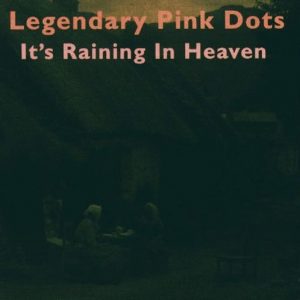
Adam: An outcome of the Dots’ transnational culture hopping is that they’ve had releases put out on many different small/ local labels: Staalplaat; Play It Again Sam; SPV Poland; Soleilmoon etc. etc. This has been great for consumer reach, ensuring that a determinedly independent band has remained a viable means for Ka-Spel and Phil Knight to receive the listeners and [assuredly minimal] cash flow that so surely deserve… however it is also a pain in the jacksie for the intrepid reviewer and/ or completist.
Greetings 9 – later re-issued in 1996 as It’s Raining in Heaven – was the ninth release by Italian label Materiali Sonori; annual releases that would compile music from bands who had played at their yearly festival in the small Tuscany village of San Giovanni Valdarno. It is, as asserted by reviewer and regular Dots Bandcamp patron RTW, “one for the die-hards only”.
The first three live tracks are taken from a show at the Ubu Club in Rennes in 1988 and sound, to these ears, rather unenergised, even lacklustre. In fairness, the Dots were engaged in a long tour that saw most of the members leave and the downbeat, vaguely melancholy sound of proceedings may reflect this.
As such, the following three tracks – ‘Only When I Laugh’, ‘La Cazza Nova’ and the intriguingly titled ‘Lyriex’ – sees the band stripped down to the bare-bones duo of Ka-Spel and Knight, twiddling their musical thumbs. ‘Only When I Laugh’ sounds like Depeche Mode recorded on Tomy toy recorder. Without the momentum provided by Wright’s now-sorely-missing violin or the electronic burbles and textures of more multi-channel recordings, the Dots have to fall back upon the anchorage of lyrics and melody, which are both thinly-sketched here. If this is a tale of obsessive, hospitalised love, it has less vampiric bite than the likes of ‘Plasma Twins‘ or ‘True Love‘. ‘La Cazza Nova’ fails to grab me also… One might be compelled to chalk this up to the limitations of a duo with a keyboard and a synthesizer, but this seems like a daft excuse considering that some of Suicide’s best tracks were composed of nothing more than vocals to a drum machine. More realistically, Ka-Spel and Knight were in a period of transition and were not firing on all-cylinders. This is not a problem for a band which consistently reaches great highs and it is worth stressing that nothing encountered thus far in ‘The Legendary Pink Dots Project‘ reaches anything like the lows of ‘The Residents Project‘ or ‘The Sparks Project‘ before it.

‘Lyriex’ is utterly throwaway but more entirely to my tastes. All decent avant-gardist bands worth their spots need at least one creepy fairground song in their repertoire, preferably several and Lyriex is only 2:10 of such delightful nonsense… The Residents/ Hardy Fox released a whole album’s worth of pretend pipe organ music with High Horses of 2001.
‘Premonition 11’ is stitched together from an original recording from 1982 and a much later piece of music circa. The Maria Dimension (1991). The fact that a decade separates these two parts gives some indication of how jarring the effect is here and Ka-Spel regrets the decision on the album’s Bandcamp page, asking rhetorically: “WHAT WAS I THINKING?” His own summation of the fusion as a “grotesque mistake” is unfairly self-critical, but I find myself agreeing that ‘Premonition 11’ should have been left alone in its original murky form (which squats intriguingly between White Noise and Comus) without the addition of a mondo jazz break-down of The Beatles’ ‘Please Please Me’ (1962)!!!
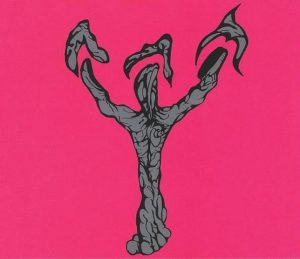
Tom: Just how much more pink could you get than the Legendary Pink Box? “None”. It’s good to see their allusion to This is Spinal Tap (1984) on their Bandcamp page as “a much-loved movie at Chez Dots”. It is indeed one of the few best film comedies of all time.
Of the 24 tracks here, we’ve encountered 19 before. Four were originally heard on 1981’s Only Dreaming (the AIDS epidemic evoking ‘Thursday Night Fever’, ‘(Still) Defeated’, ‘Voices’, ‘Black Highway’. Two were heard on Kleine Krieg (1981): the slightly less Madness or Specials-sounding version here of ‘One for the Pearl Moon’ and the appallingly relevant ‘rape culture’ scenario of ‘Closet Kings’. One was first heard via Atomic Roses (1982): ‘Hauptbahnhof’, while two were initially encountered on the same year’s Apparition: the never-more-relevant abuse of power situation of ‘The Blessing’ and ‘God Speed’. One track was first heard on 1983’s Basilisk (the sterling ‘Clean Up’). Six first appeared on 1983’s Chemical Playschool 3 & 4 (‘Obsession’ with its early-Bowie like vocals, the celestial ‘Film of the Book’, ‘Ego Tripper’, ‘Curse (The Sequel)’, ‘The Plasma Twins’, ‘Apocalypse Soon’). One track (‘Close Your Eyes, You can be a Space Captain’) we first encountered via Traumstadt 1 (1988). Two appeared very recently on 1989’s Traumstadt 5 (‘Time Dance’ and ‘Government Health Warning’). The latter track is in the form I know it best – as Adam said last time, a rattling good knee’s up to take its place within a Christmas mix.
Of these 19 tracks, constituting the majority of this compilation’s 124-minute length, some were a little wearying to hear again, but it was great to be reacquainted with many: ‘Hauptbahnhof’ and ‘Black Highway’ sounded the freshest, while it is always great to hear such cornerstones of the early LPD output like ‘Film of the Book’ and ‘Voices’. I will never tire of these verdant glories.
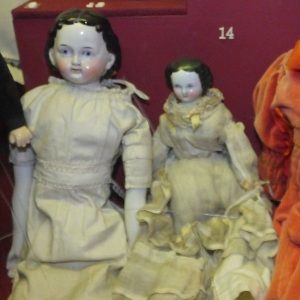
‘Tanz Der China Dolls’ is archetypal LPD stuff: an elegantly encircling tune with lyrics of dark intent. The inanimate is inhabited: “We’re broken china dolls”. It’s a stately dance of the dolls, structured by the inexorable organ chords. Nothing especially new for us, but it’s a sound iteration of LPD wiles. They can do this sort of thing in their sleep…
Then perhaps the best ‘new’ track, eighth on the release, is ‘A Day at the Dreamies’; this posits the scenario of watching dreams as being like a visit to the movies. There’s a very 1960s New Left counter-culturalism about this vision: “where everyone’s an artist and all that’s required is a pill and a pillow”. Accompanied by a very 1980s bass sound, EKS informs us about Winston Churchill, who “barks a strict command [to be silent] to a box of toy commandos” who comprise a noisy classroom. There’s a clear fount of delirious imagery, “where wishes turn to promises” and dreams and stray thoughts become factual to the subjective mind. I experienced delirium, while in hospital following brain surgery, and this hallucinatory lyric evokes how strange and dislocating a state delirium can be.
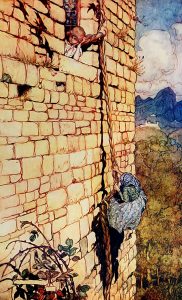
‘Rapunzel’ sees EKS in spoken-word mode, outlining a vaguely disquieting scenario of the fairy tale character’s being visited by “voyeurs and tourists” rather than princes. The music is, again, burbling arpeggios – this time, with tortured wailing in the background. There are desperate imperatives – “SMASH the window, SMASH the atom” – as the song closes. It ends with a cynical repetition: “it’s all… a lie, a lay, a screw”. Internet transcriptions state the last word is “secret”, but that isn’t borne out by listening. This track seems fairly typical of the Legendary Pink Dots at this stage in their life, transitioning from the ‘Patrick Q. Wright era’ and not quite yet arriving somewhere new.
Then, there is ‘Swordfish Lament’, a dazed, phased, dank piece, again with the omnipotent arpeggios circling incessantly. This track does have violin, a comparative rarity on this compilation. Eventually, the arpeggios stop. It constitutes a reasonable, aqueous soundscape – marginally preferable to ‘Premonition 18’, which we dealt with last time. However, ‘reasonable’ isn’t really what we are after with the music of the Dots!
The final track is ‘Premonition 13’. We’ve previously had ‘Premonitions’ 4, 1, 2, 3, 10, 16, 8, 5, 9, 18 and 11, so this is the twelfth in an irregular series. When will we be treated to #6 and #7?! (Adam ed. Premonition #9 by the looks of it!) There’s more initial violin, which gives way to brisk arpeggios and spoken-word ruminations about “a new Pompeii”. EKS’s vocals become increasingly high-pitched in this. There are snatches of Gregorian chant and mournful wind instruments. It moves into a final phase of constructive, ethereal sounds: like a spaceship landed on a curious planet laden with serenely indifferent life-forms. There’s a vaguely Gamelan quality to this last section – strangely soothing. However, this doesn’t quite add up to a Premonition that matches some of the better previous ones.
So, we come to the end of a run whereby six of the last seven releases we have discussed have been compilations of one sort or another. Good! There have been some good things along the way, but too little that is essential.
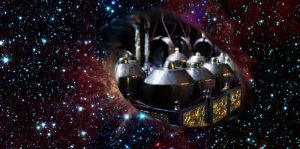
Adam: The Legendary Pink Box is, like the Residents’ Icky Flix (2001) or Sparks’ Plagiarism (1997), both a compilation and a re-imagining of a prolific band’s history at a point where each band’s remaining core duo wished to look back and take stock of where they were coming from and where they were going to. In 2001 the Residents had just finished a whole slew of studio-bound multimedia projects and were heading back out on the road with new members Molly Harvey and Nolan Cook; in 1997 the Mael brothers had reached a point where they were able to put what are generally regarded as their worst years (1984-1988) behind them and enter a new period of creative rejuvenation; in 1989 the Dots, having previously existed as a band with at least three and often half-a-dozen members, were down to their core duo of Edward Ka-Spel and Phil Knight and were about to experience a creative renaissance of their own with a run of albums from 1990 to 1995 often considered their defining work to date.
These albums are, broadly speaking, considered to be in the psychedelic rock genre (albeit gothic psychedelic rock) not industrial synthpop.
As such, The Legendary Pink Box is a very selective view of the band’s history in which several songs have (as with Icky Flix and Plagiarism) been re-recorded (some live; some not) as versions which now sound markedly – even startlingly – different from the originals. Thankfully Tom has already done the sterling work of tracing back the origins of these tracks to the various albums and compilation on which they first appeared, so I will just note some of the differences and similitudes.
Originally the Legendary Pink Box was released as a 3-LP set of 6 sides.
We’ll start counter-intuitively with the second LP of the set…
Side C features:
‘(Still) Defeated’
‘Voices’
‘Hauptbahnhof’
‘Closet Kings’
‘Clean Up’

To my ears, the ever-captivating ‘Voices’ sounds the same as it ever was, as do ‘Hauptbahnhof’, ‘(Still) Defeated’ and ‘Clean Up’, which remain dreamy and enigmatic. ‘Closet Kings’ is sick-making in its jaunty predations (as presumably intended). With the possible exception of ‘Clean Up’ these personally strike me as tracks highly worthy of inclusion in such a retrospective and, indeed, there’s a lot of cross-over here with Ancient Daze (2000), my best-of-the-early-Dots compilation of choice. I would have also included the heart-breaking ‘Frosty‘, but it might have been left a little fragile and small next to its more pugilistic competition (indeed, it might have even seemed perverse placing it between the likes of ‘Closet Kings’ and ‘Thursday Night Fever’).
Side D features:
‘Government Health Warning’
‘Film Of The Book’
‘Ego Tripper’
‘Curse (The Sequel)’
‘The Plasma Twins’
‘Apocalypse Soon’
Now, I like ‘Plasma Twins’ and ‘Apocalypse Soon’ more in theory than in practice. They have some great lyrics (“I’ll show you my muscles if you give me your corpuscles” indeed!) but both leave me rather cold. I’ve always had a soft-spot for ‘Film of the Book’ because I’m a sucker for icicle arpeggios. ‘Ego Tripper’ is coyly intimate pretty Syd Barrett-like psychedelica from the bedroom (and the bathroom). The other two tracks are fun but throw-away, ‘Government Health Warning’ doubly so!
Sides A, B and E are where we get the re-worked material and, as with the re-workings on Icky Flix (though not on Propaganda), I generally prefer the originals!
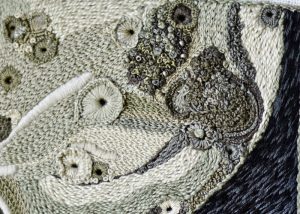
Some of the tracks already tended towards the space-rock end of the psychedelic spectrum. ‘Time Dance’ starts a little more abruptly than the last time we heard with, with the fingerstyle guitar lower in the mix, washed out by multi-tracked vocals and reverberant strings. The plaintive ‘Obsession’ sounds like the original recording has been put adrift in the cosmos awhile, left to soak up some cosmic rays. ‘Pearl Moon’ is just that bit more strung-out and bug-eyed; ‘The Blessing’ even more sinister.
‘God Speed’ actually might be an improvement – it’s less shrill and squelchy and, in fact, the more expansive production allows the lyrics to be heard, which is pleasing since it contains lines as gloriously ridiculous as “Hellzapoppin’, pillzapopin’, eyesapoppin! Amphetamine eyes!” Moreover, a late 1980s track like ‘Close Your Eyes, You Can Be a Space Captain’ was clearly always intended as an atmospheric cosmic rocker, penned when the Dots were already drifting in that direction, so it is only improved by the more expansive and sonically textured production given to it here.
By contrast, the very early 1980s tracks originally recorded on the most low-fi of low-fi electronic equipment have fared – and here I’m speaking only for myself – far less well.
‘Black Highway’ was a masterpiece back on 1981’s Only Dreaming but now sounds like it’s been given the full Phil Spector treatment! It’s wall-of-sound dense, packed thick with burbling and bubbling and ray-gun sound effects and utterly inappropriate guitar picking and really there are just too many irons in the auditory fire! I feel quite strongly that a song about oppressive automobile madness should sound tinny and claustrophobic, but not over-layered to the point of auditory incomprehension! Too rich for my blood.
Meanwhile, ‘Thursday Night Fever’ strips away the subtle menace of the original for full-on Nine Inch Nails horrorshow grotesquerie. The Dots have always walked the giddy tightrope of good taste and generally, when they choose to leap off it, they do so with such giddy abandon – as with Asylum‘s ‘Fifteen Flies in the Marmalade’ (1985) – that the results are infectious… Here I just find them an irritant! AH well!

The new tracks though are resplendent and more than make up for any disappointments one may (or may not!) feel about the re-recorded tracks!
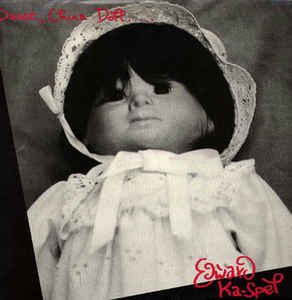
‘Tanz Der China Dolls’ is only new to the Dots… since the original was a Ka-Spel solo track from his first EP Dance, China Doll (1984). The lyrics read like a series of instructions given to a person hoping to keep a pet in abject living conditions – “Find a cage, find a chain. Find a plate, slip it under… feed it every other day. Keep the scenery the same, keep the family away.” The lyrics grow only more troubling as it becomes increasingly uncertain how cognisant this creature is of its subjugation and… stomach-churningly… whether this “creature” might not be a human being as the lyrics shift from “it” to “her” and the lyrics grow more personal. In this it recalls the “monkey” prisoner from ‘The Tower 2’ from the eponymous 1984 album (where the monkey is a “he”) and Chemical Playschool 3 & 4 (where the monkey is a “she”). On those albums however the dehumanisation of the subject was linked to a structural critique of political power… whereas in ‘Tanz Der China Dolls’ there is – queasily – no obvious critical position offered that might allow us to process the disturbing material.
[On a far less pornographic level] it is like the difference between Pasolini’s Salò (1975) and de Sade’s original novel 20 Journées de Sodome (1785) – the former embeds its cruelties within a structural critique of fascism whereas any critique in the later can only be assumed rather than inferred. From knowing Ka-Spel’s tendency to occasionally adopt disturbing perspectives – as in this very album’s ‘Closet Kings’ or ‘Violence’ from Only Dreaming – to shed light upon abuses and, indeed, Ka-Spel’s own progressive personal politics (as much as these are known) we confidently presume not to take the song at face value – a comfort when the face is shown is like, to quote Wilfred Owen, “a devil’s sick of sin”.
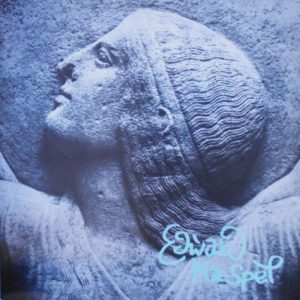
Musically the version of ‘Tanz Der China Dolls/ Dance of the China Dolls’ on the Pink Box is sonorous as a gutted organ, with something of the magisterial melancholic evil of Wendy Carlos‘ reworking of Henry Purcell’s ‘Music for the Funeral of Queen Mary’ (1695) from Stanley Kubrick’s A Clockwork Orange (1971). Personally I prefer the odd military-percussive parpings of the original, eccentric as it is. I find it more slyly insidious; less obviously evil. But then, I prefer Dr. Strangelove (1964) as a critique of the abuses of power to A Clockwork Orange!
I tend to need even the roughest of chuckles to swallow the bitterest of pills.
‘A Day at the Dreamies’ is a convincingly conventional 1980s goth rock track in the vein of The Cure or even Kate Bush at her vampiest. It has several recognisable name contributing – Wright on violin; Callaway on bass; Stret Majest/ Barry Gray on guitar. I found it hard to get an anchor on the stream-of-consciousness lyrics; though, as Tom has suggested, maybe one needs to be rather woozy and altered for it to ring clean and true.
‘Rapunzel’ is as unanchored musically as ‘ADatD’ is lyrically. In fact, I’d rather Knight and Ka-Spel had just left it as a soundscape since the vocals seem to impede my getting lost in the track’s atmospherics. Keeping track of the densely narrative lyrics at a quarter to midnight was an ambitious challenge I was unable to meet. ‘Swordfish Lament’ is meanwhile an instrumental… the experience of which is rather like I’d imagine being hypnotised while undergoing an MRI scan to be. It’s definitely a dark room + headphones track. I rather like this kind of stuff and Ka-Spel and Knight are very practised in weaving such late-night auditory textures.

Side F of The Legendary Pink Box is given over to ‘Premonition 13’, which brings me to the point of this review where I finally disagree with Tom (which happens far less often than one might expect!) For, by my reckoning ‘Premonition 13’ is the best one yet! It’s the only track on The Legendary Pink Box which [bearing in mind that I already own Ancient Daze and Chemical Playschools 1, 2, 3 and 4] I felt immediately compelled to buy. If a mausoleum could sing it would sound like ‘Premonition 13’! It sounds as hexed as its numerical signifier would imply! The atmospherics here absolutely work for me and transport me deep underground. It’s the Dots at their most unapologetically goth and velvety. A new film version of Dracula would be justified just by virtue of including in on its soundtrack. It might help that I stayed up into the early hours of the morning last night reading Al Columbia’s Pim & Francie: The Golden Bear Days (2009) through in one sitting. None more black indeed.
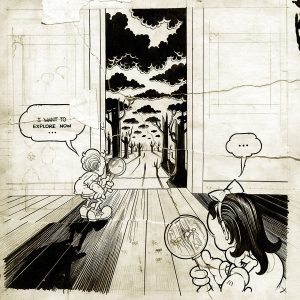
P.S. The image at the top of the page is the preview image for Pim & Francie: The Golden Bear Days from comixology.co.uk
If you make **one purchase** (outside of LPD albums, of course!) based upon my recommendation this year then I strongly advise you click on the link and make it this one. Currently retailing at point of writing at the frankly absurd price of £5.99!!